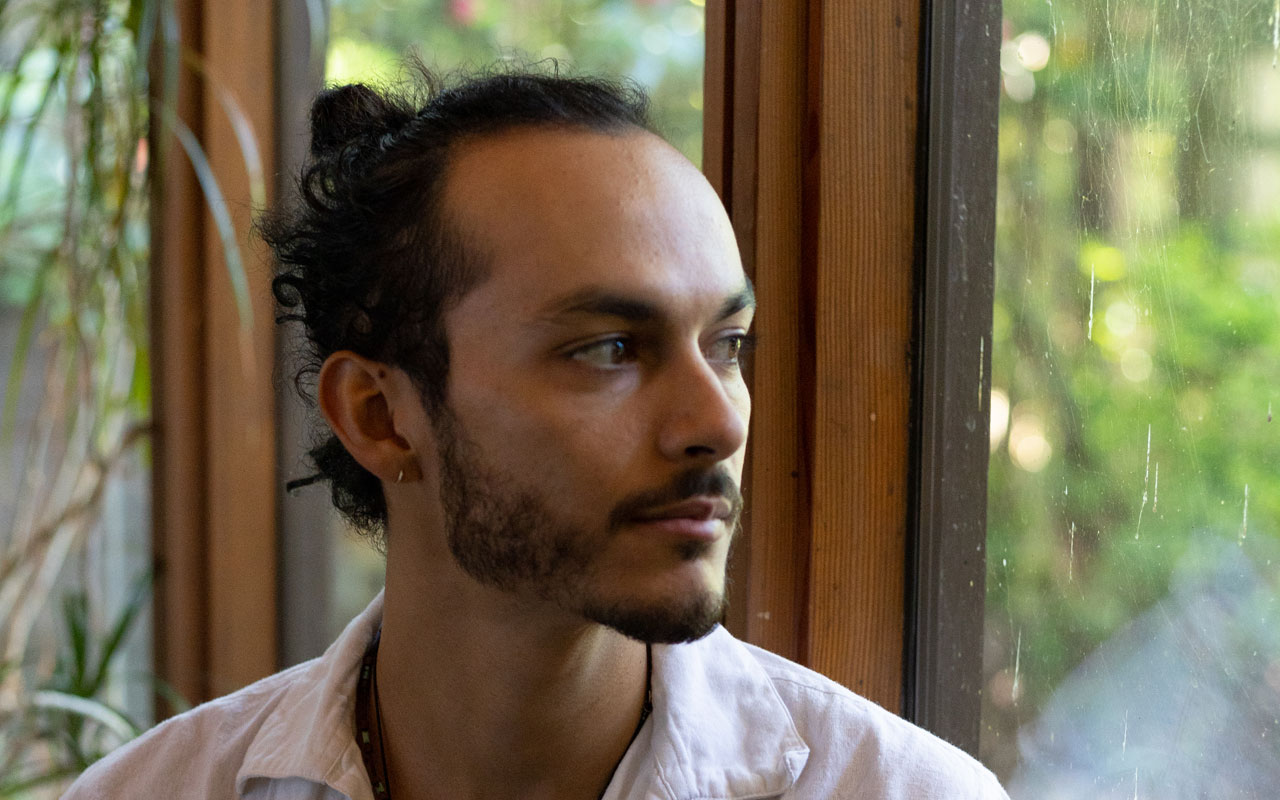
Carlos Snaider photo by Dana Waldron
Seated in the living room of his Capitol Hill loft, steps from the relocated Cafe Racer, guitarist Carlos Snaider recalls his early days in town. “When I first moved to Seattle, one of the places I frequented as a way to connect with other musicians and build some community was the Racer Sessions. Which is funny — I haven’t been in a long time and it’s right here.”
For Snaider, whose musical interests range from the propulsive salsa of Eléré to a longstanding collaboration with percussionist Rajna Swaminathan that seeks the common ground between jazz and the Carnatic music of South India, the musical freedom he witnessed at the University District Racer Sessions helped confirm that there was room here for his expansive sensibilities. “It was welcoming to any type of musical approach,” he recalls. In addition to veteran improvisers, “you’d get even beginner musicians, or people who just wanted to make sounds…it was a space that celebrated eclecticism within music.”
These days, alongside Eléré bassist Kelsey Mines, Snaider is bandmates with Racer Sessions co-founder Chris Icasiano and High Pulp keyboardist Antoine Martel in EarthtoneSkytone, an experiment in song form combining jazz angularity with gorgeous, pop-informed melody and the delicate vocal harmonies of Mines and Snaider. Initially, a guitar-bass-vocals duo, Icasiano’s fluid, nimble drumming and Martel’s synthesizer — alternately astringent and atmospheric — have imbued the meditative compositions of Mines and Snaider with a fresh vitality.
Nearly two years in the making, EarthtoneSkytone’s self-titled debut album, out later this summer, represents a departure from Snaider’s usual recording process. Where Eléré thrives on the energy of full-band, live-in-the-studio takes, EarthtoneSkytone takes a more deliberate tack, augmenting the foundation of live tracks recorded by Snaider and Mines at the Jack Straw Cultural Center’s University District studio with extensive synthesizer and drum parts laid down at Martel’s house, all edited together by Snaider at his loft. While Snaider appreciates the efficiency of “showing up and being able to execute in a day or two days” like Eléré, he has come to value the process of “really being intentional about the sound.”
Snaider, one of three composers commissioned to premiere new works at the 2023 Earshot Jazz Festival, approaches his forthcoming performance with similar intentionality. He plans to spend the summer refining his ideas by making them part of his daily life, composing guitar loops on the spot and letting them repeat “while I wash the dishes,” searching for the snippets that get stuck in his head. “I enjoy that slow process of really listening, seeing what themes emerge within myself by really listening to that thing,” he says.
The son of an Ecuadorian father and a Puerto Rican mother, Snaider proposed a concert of what he terms “avant-Latin” music, combining the tactile, physical qualities of Latin music — he cites the “skins and wood” of congas and timbales — with the abstract possibilities of analog synthesizers and modern electronic music.
While Snaider encourages the audience to dance, he intends his festival performance to evoke Latin music in an oblique way. “I’m not trying to do a salsa band. I’m not trying to play son. I don’t want it to be specific dance styles, but I want to somehow get people to feel the rhythm,” he says.
Snaider’s explorations of his Latin heritage are rooted in his studies with his mentor Josefina Báez, a Dominican poet and theater artist, and founder of the Performance Autology creative method. As a guest speaker in a Harvard University course called, “Performing Latinidad,” Báez “got all of us nerdy Harvard students doing different performing exercises to try to get us into our bodies, and that ended up being the foundation for how our own personal narratives and stories emerge — for developing our creative performance of Latinidad, whatever that means.” In subsequent workshops and private lessons, Snaider immersed himself in Báez’s system, which trains artists to treat their personal narratives as the foundation of a lifelong process of research and discovery.
“I just learned so much about my own relationship to creativity and how to have a performance, what you do on stage, be like a window into the process that you cultivate all the time,” Snaider reflects. “So that’s ultimately became my philosophy for music making. And it ultimately comes down to a life where I’m trying to cultivate awareness, and internal quiet, and joy.”